- Home
- David Downing
Zoo Stationee Page 31
Zoo Stationee Read online
Page 31
The Grand was fully operational though, its multilingual staff and art nouveau fittings a match for any barbarian invasion. Russell had stayed there twice before, once in the late 20s and once the previous September, when Chamberlain and Daladier were licking Hitlers boots in Munich. He asked the receptionist if anything crucial had happened in the last seven hours, and was told that it hadnt. Monsignor Tiso, he supposed, was still en route to Berlin.
Russells room was on the first floor, at the back. Apart from the lack of a view it seemed thoroughly adequate. After those few moments at the frontier, though, a pigsty would have seemed adequate, provided it was in Czechoslovakia. He dumped the unopened suitcase on the bed and went back down in search of dinner.
The hotel restaurant also seemed a lot emptier than usual, but the baked carp, fruit dumplings, and South Moravian white wine were all delicious. A walk seemed in order, but he reluctantly decided against onehis train left at 11:40 the following morning and he was anxious for the Soviets to collect their papers. The thought of having to dump them in the Vltava was more than he could bear.
He didnt have long to wait. Shortly before 10:00 he answered a familiar-sounding tap on his door, and found Irina Borskaya anxiously glancing up the corridor. Come in, he said superfluouslyshe had already dodged under his arm. She was wearing the same long, charcoal gray skirt, but a different blouse. Her hair seemed a shade lighter, and this time there was a hint of bright red lipstick on her thin lips.
The papers, she said, sitting down in the upright chair.
Its nice to see you, too, Russell said, opening the suitcase. After dumping his possessions onto the bed, he clicked the false bottom open, removed the sheaf of papers hed picked up in Gaarden, and handed them over.
What are those? she asked, as he placed the envelope containing McKinleys papers on the bedside table.
A story Im working on.
She gave him a disbelieving look, but said nothing. After flicking through the naval dispositions, she reached inside her blouse and brought out a money clip containing Swiss Franc notes. High denomination Swiss Franc notes. We promised to pay you well, she said, as if reprimanding him for any possible doubts he might have had on that score.
Thank you, he said. Its been a pleasure doing business with you.
There is no need for the pleasure to end, she said. We have other work. . . .
No, Russell said firmly. We had a simple dealyou helped my friend out of Germany, I brought your papers to Prague. Were quits. I wish the Soviet Union well, but not well enough to die for it.
Very well, she said, rising from the chair and cradling the papers in one arm. The fact that she had no obvious place to conceal them led Russell to the conclusion that her room was close to his own. If that is how you feel, she told him, then we understand. And we thank you for what you have done.
Somewhat astonished by the ease with which his resignation had been accepted, Russell opened the door for her.
When are you leaving? she asked.
Tomorrow morning.
Then have a good journey. She put her head out, glanced to the left and the right, and walked off down the corridor in the direction of the stairs. The whole encounter had taken less than five minutes.
BEFORE GOING DOWNSTAIRS THE NEXT MORNING Russell wrote a short covering letter to McKinleys editor in San Francisco, explaining how he had come by the papers and offering his own brief summary of their significance. After breakfast in the hotel restaurant he walked around the corner to the main post office on Jind?iská, bought and addressed a large envelope, and asked for the quickest possible delivery. Itll be gone before he gets here, the clerk observed, reading Russells mind. On the afternoon plane to Paris, he added in explanation.
Satisfied, Russell walked back to the Grand, collected his suitcase, and checked out. He was early for the train but he liked Masaryk Station, and he liked the idea of being closer to home.
As it happened, it didnt matter, because he no longer had a seat. Two carriages of the train, including his own, had been commandeered by President Hacha and his swollen entourage. The Czech President, Russell gathered from discussions with sundry railway officials, had also been invited to Berlin, and a heart condition prohibited him from flying. Russell was assured that two extra carriages would be added to the night train, but no one seemed capable of explaining why they couldnt be added to this one.
Oh well, Russell thought, there were many worse places to spend a day than Prague. As President Hacha and his dicey heart were about to find out.
He left the suitcase in the left luggage, took a tram back to the town center, and spent the next couple of hours ambling down the east bank of the river. The Czech flag was still flying from the ramparts of the famous castle, but for how long? A few days at most, Russell thought, and the citys residents seemed to agree with him. As he walked back through the old town in search of a late lunch he noticed rapidly lengthening lines at one baker after another. News of Hachas trip had obviously spread.
This was it, Russell thoughtthe end of any lingering hopes for peace. There was no way of presenting this as part of some grand scheme to bring Germans home to the Reich. Hitler had thrown off the cloak. It was no longer if, but when.
The sight of an orthodox Jew on Národní Street reminded him of Albert. Long gone, he hoped, but what of Czechoslovakias 100,000 Jews? What were they doing this afternoon? Crowding the stations, loading their carsor just sitting tight and hoping for the best, as so many German Jews had done? This orthodox Jew had a bagful of groceries, and seemed in no hurry to go anywhere.
He thought about what Albert had said during the drive to the Görlitz, that kindness had become more worthy of note, and more interesting to fathom, than cruelty. It was certainly harder to find.
With darkness falling he sought out a bar, and sampled several different Bohemian beers. Each tasted better than the last. He raised a toast to McKinleys papers, now hopefully resting in some Parisian sorting-office, and another to McKinley himself. From time to time, over the last six weeks, he had found himself wondering why they had killed the young American. It was the wrong question to ask, he realized. It was like asking why they had killed Felix Wiesner. They might have had, or thought they had, particular motives, but the real reason was much simplerthey were killers. It was what they were. It was, in truth, all that they were.
THE COLD AIR STREAMING THROUGH his cabs broken window kept him awake on his way to the station, but once ensconced in the overheated train he soon found himself falling asleep. The jerk of departure woke him for long enough to recline his seat, and the last thing he remembered was that he should have phoned Effi.
The next thing he knew he was waking with a sudden feeling of panic. He looked at his watch. Almost three hours had passedthey had to be nearing the frontier. But that didnt matter anymore, he told himself. His subconscious was obviously stuck on the outward journey.
And then it occurred to him. He had never closed the false bottom. After Borskaya had gone he had just shifted the suitcase onto the floor, and this morning he had simply shoveled all the clothes back in.
The thought of another wrestle with a suitcase in a toilet made him groan, but it had to be done. He took it down from the overhead rack, and carried it out to the vestibule at the end of the car. Shading his eyes with his hands, and sticking his face up against the window, he could just make out the river running beside the tracks.
Inside the toilet he opened the suitcase, threw all the clothes on the floor, and went to close the false bottom.
It was already closed.
He stood there for a few moments, thinking back. When had he done it?
He hadnt.
Clicking it open, he found several sheets of paper hidden inside. Holding the first one up to the dim light of the cubicle, he found that it contained a list of names and addressessix unde
r Ruhr, three under Hamburg. The other sheetsthere were nine of themfollowed a similar pattern. There were almost a hundred people listed, from all the different parts of Germany.
Who were they? No indication was given, none at all. But one thing was certainthe Soviets meant them to be discovered. That was why Borskaya had asked him when he was leaving, Russell thoughtthey had been inserted while he was downstairs at breakfast or out posting McKinleys papers. That was why shed accepted his resignation so easily. And the moneythat worked both ways. Such generosity might keep him working for them, but if it didnt, so much foreign currency would be hard to explain.
The names, he realized, had to be German communistsreal or imaginary. Were these men and women whom Stalin wanted culled, but who were beyond his reach? Or was the list a work of fiction, something to keep the Gestapo busy while the real communists got on with their work? A bit of both, Russell guessed. A few real communists to keep the Gestapo believing, and then the wild goose chase.
He shivered at the nearness of his escape, and realized that the train was slowing down. He shoved the suitcase to the floor, yanked up the lid of the toilet, and started tearing the sheets of paper into smaller and smaller pieces. Once these were all in the bowl he reached for the lever, filled with the sudden dread that it wouldnt work.
It didnt. As beads of cold sweat multiplied on his forehead, Russell worked the lever again. It coughed up some water, but nowhere near enough.
There was a heavy knock on the door. We are approaching the frontier, a German voice said.
Right, Russell shouted back. What should he do? Try and swallow all the bits of paper, along with whatever international germs the toilet bowl had been saving for him? Anything but that.
The train was still decelerating. He looked for some access to the toilets workings, but everything was screwed down. He tried the lever one more time, more out of habit than hope, and for reasons known only to God it flushed. He stood there, reveling in the sight of empty water, until sweet relief gave way to a nightmare vision of Gestapo officers combing the tracks for all the pieces and painstakingly gluing them back together.
Get a grip, he murmured to himself. He picked up the suitcase, clicked the false bottom shut, and covered it with clothing retrieved from the floor. As he left the toilet he caught a glimpse of his face in the mirror, and wished he hadnt. He looked deranged.
The train was still moving, the lighted platform of the Czech border point unrolling past the window. It was snowing now, thick flakes drifting down through the cones of light. We are not stopping at the Czech crossing point tonight, the German railway official was saying to a female passenger. No Czechoslovakia, no border, Russell thought. Did that mean they were not stopping at the German border either?
No such luck.
The passengers decanted onto the platform, a long strip of spotlit tarmac in a sea of darkness. As Russell joined the line, a new and highly unwelcome thought occurred to him. If the sheets were meant to be found, there had to have been a tip-off. The false bottom might be empty, but it was still a false bottom.
One explanation seemed workable, but only if the officials on duty were different from the ones he had encountered the day before. As the queue sucked him out of the snow and into the building, he anxiously examined the faces, but there were none he recognized.
The immigration official took one look at his passport and gestured to a man in plain clothes behind him. Gestapo. This way, Herr Russell the man said, without looking at his passport. He walked across to a large table, where another man in plain clothes was waiting.
Put your suitcase on the table, the first man said. He had long hair for the Gestapo, and an almost likable face. As he opened the suitcase, Russell noticed that his fingernails badly needed trimming.
Could I have your name and rank? Russell asked.
Ascherl, Kriminalassistent, he said without looking up.
He took out the clothes with more care than Russell had, and piled them on the other end of the table. Effis script was placed on the top. Then he ran his hands round the inside of the suitcase, obviously looking for a way of accessing the false bottom. Borskaya had been behind him when he opened it in the hotel room, Russell remembered.
How do you open it? Ascherl asked him.
Russell looked perplexed. Its open.
The hidden compartment, the Gestapo officer said patiently.
Russell tried to look even more perplexed. What are you talking about?
Ascherl turned to his subordinate. Your knife, Schneider.
Schneider pulled out a large pocket-knife. Ascherl looked at the suitcase for a moment, ran his hand along inside it, then abruptly turned it upside down, pressed in the knife, and patiently sawed from one side of the bottom to the other. This hidden compartment, he said, reaching in a hand.
His look of triumph faded as his scrabbling hand failed to find anything in it. Two more cuts and he was able to wrench back a section of the reinforced leather bottom and shine a torch inside.
Where is it? he asked patiently.
Where is what? Russell replied, trying to sound bewildered. Most of the others in the room were watching them now, eager to see how the situation played out.
Let me put it another way, the Gestapo officer said. What reason do you have for carrying a suitcase with a hidden compartment?
I didnt know it had one. I only bought it yesterday, from a Jew in Prague. He smiled, as if the answer had just occurred to him. The bastard probably used it to smuggle valuables out of the Reich.
Undoubtedly, Ascherl said.
Russell was still thanking heaven for his inspiration when he noticed a new face in the roomone of the customs officials from the day before. The man was looking straight at him, with an expression on his face that seemed part indignation, part amusement.
But you are from Berlin, Ascherl continued. Did you travel to Prague without a suitcase?
It fell apart when I was there. I needed a new one. Russell braced himself for an intervention by the customs official, but there was none.
And this Jew just happened along?
No, theres a market, like the ones they used to have in Berlin. The customs official was still looking at him, still saying nothing. Was it possible that he didnt remember this suitcase from the day before?
Your wallet, please, the Gestapo officer said.
Russell handed it over, and watched him remove the currencya few Czech notes, some Reichsmarks, the clip of Swiss Francs.
Where did these come? Ascherl asked.
I wrote an article for a Soviet paper, and they paid me in Swiss Francs. Several months ago now. I thought they might be useful in Prague. The SD knows all about this, he added. Look, he said, indicating the wallet, can I show you something?
Ascherl handed it back, and Russell pulled out the folded sheet of Sturmbannführer Kleists letter.
As the Gestapo man read it, Russell watched his face. If the list had been found in the hidden compartment then the letter could have been ignored. As it was, all Ascherl had was a story full of holes that he couldnt fill in. Would he keep on trying, and risk offending the big boys on Wilhelmstrasse?
I see, he said finally, and looked up at Russell. It seems we are all victims of the same plot. We received information . . . well, I wont go into that. It looks as though the Reds have tried to set you up.
The suitcase was suspiciously cheap, Russell admitted. Across the room the customs official was still watching, still doing his Mona Lisa impersonation.
Its not worth much now, Ascherl said, surveying his knifework.
Russell smiled. You were doing your duty, as any friend of the Reich would wish.
Ascherl smiled back. We have others. Confiscated from Jews. Perhaps we can find you another one with a hidden compartment. Schneider?
&
nbsp; Ascherls assistant disappeared into an adjoining room and reemerged almost immediately with two suitcases. Russell chose the smaller of the two, and packed it with his clothes and Effis script. The customs official had disappeared.
But not for long. As Russell came out of the building the man fell into step beside him. Nice suitcase, he said.
Russell stopped.
Im getting married next month, the man said, carefully positioning himself between Russell and any watchers in the building they had just left.
Russell took out his wallet, removed the clip of Swiss francs, and handed it over. A wedding present?
The man smiled, gave him an ironic click of the heels, and strode away.

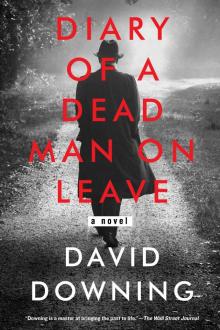 Diary of a Dead Man on Leave
Diary of a Dead Man on Leave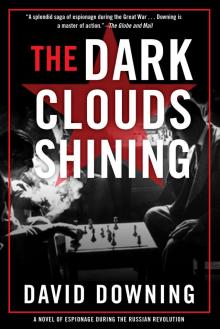 The Dark Clouds Shining
The Dark Clouds Shining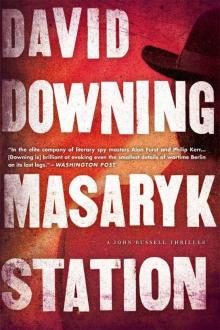 Masaryk Station (John Russell)
Masaryk Station (John Russell)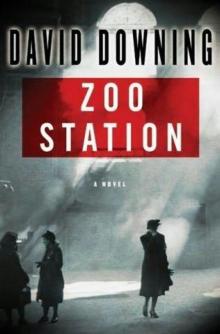 Zoo Stationee
Zoo Stationee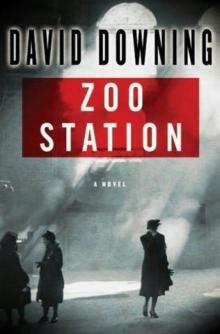 Zoo Station jr-1
Zoo Station jr-1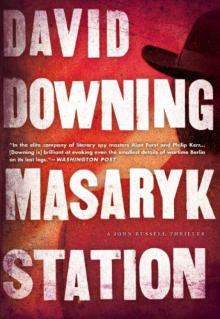 Masaryk Station
Masaryk Station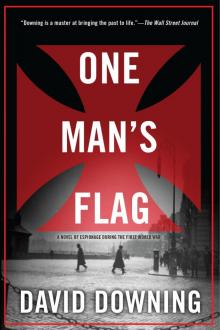 One Man's Flag
One Man's Flag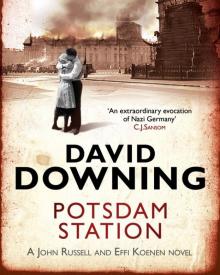 Potsdam Station jr-4
Potsdam Station jr-4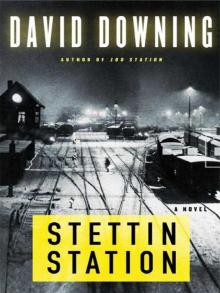 Stattin Station jr-3
Stattin Station jr-3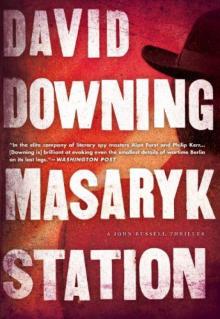 Masaryk Station jr-6
Masaryk Station jr-6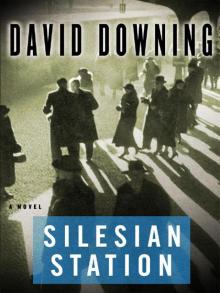 Silesian Station (2008) jr-2
Silesian Station (2008) jr-2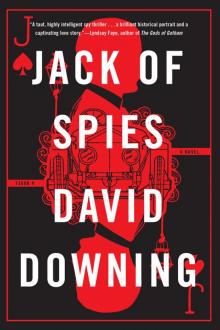 Jack of Spies
Jack of Spies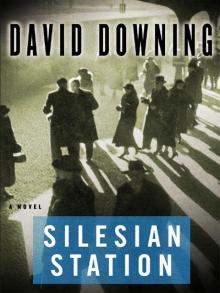 Silesian Station (2008)
Silesian Station (2008) The Moscow Option
The Moscow Option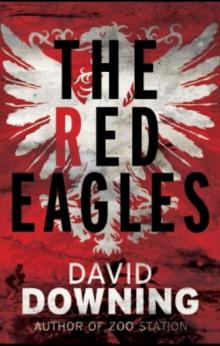 The Red Eagles
The Red Eagles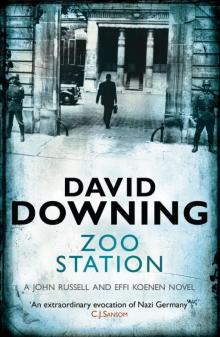 Zoo Station
Zoo Station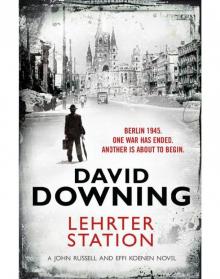 Lehrter Station
Lehrter Station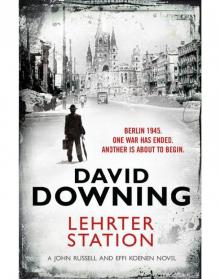 Lehrter Station jr-5
Lehrter Station jr-5